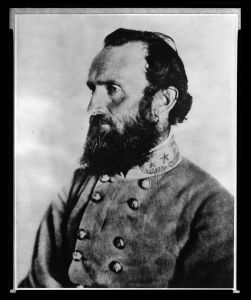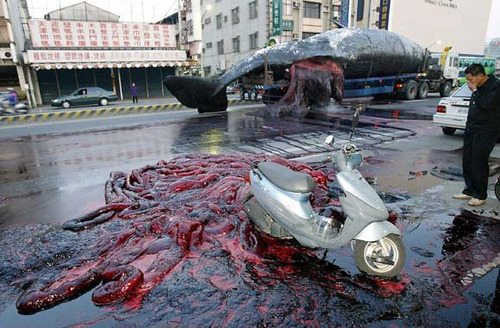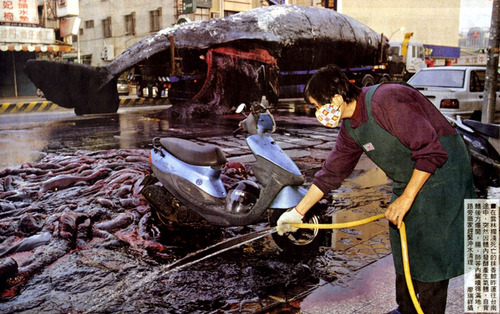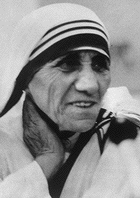During the debate a couple of weeks ago over whether statues of Chiang Kai-Shek and Chiang Ching-Gwoh should be removed from Taiwanese military bases, a couple of arguments were made that merit a bit of scrutiny. The KMT tried to make the case that because Americans honor Dwight D. Eisenhower and Stonewall Jackson in their military academies, the Taiwanese military should continue to similarly honor the dictatorial Chiangs. Let’s take a look at their arguments:
1. Dwight D. Eisenhower
A statue of this general and American president apparently stands in West Point Military Academy. This, the KMT says, is proof that it’s not a violation of military neutrality to have monuments to a political leader in a military school.

(Dwight D. Eisenhower photo from Wikipedia.)
It should be pointed out that as far as political leaders go, Eisenhower is pretty uncontroversial. You know all those "I Like Ike" buttons? Believe it or not, people wore them because they actually, well, LIKED Ike. They never had to worry that if they didn’t wear them they might be sent to Green Island.*
Sure, intellectuals of the time may have been "Madly for Adlai", but Eisenhower’s domestic policy was to leave the Democrats’ New Deal in place, while promising to administer it more efficiently. If he’d been a Reaganesque figure, his statue in the military academy might’ve (might’ve!) garnered a little more political opposition.
The second point – and how do I put this delicately? – is that Eisenhower was a general who actually won a war. In contrast, Chiang Kai-Shek, by virtue of his military genius, managed to lose VIRTUALLY ALL OF CHINA to the communists. I leave it to the reader to decide which of those two achievements is more deserving of being immortalized in bronze.
2. Stonewall Jackson
A statue of the Confederate general still stands on the grounds of Virginia Military Institute. The KMT believes this demonstrates that monuments to important figures shouldn’t be cast aside just because they happen to be subject to disputes over the rightness or wrongness of their causes.

(Stonewall Jackson photo from Wikipedia.)
Stonewall Jackson DID fight for the Confederacy, and as such, it must be admitted that he’s a bit more controversial than Ike. The Civil War may have been about Northern tariffs on imported manufactured goods and about the constitutional right to secession, but no one can deny that it was also about slavery. And ultimately, Jackson fought on the wrong side of the latter issue. Bearing this in mind, I’ll make the best case that I can in favor of retaining Jackson’s VMI statue.
The first thing that should be noted is that it’s not Chiang’s cause that most people object to – it’s his actions vis-a-vis his democratic opposition. In our time, we can look at someone like Stonewall Jackson and shake our heads sadly that he died unconsciously serving an unjust cause, despite his own personal goodness and decency. But with Chiang, the situation is reversed: fighting communism was a just cause, but his methods of political repression towards the Taiwanese were thoroughly lacking in decency.
Secondly, Stonewall Jackson is worthy of commemoration because he was one of America’s greatest generals EVER. Even his Northern enemies never gainsaid this. I wonder how many Chiang loyalists, let alone his communist enemies, seriously believe that Chiang Kai-Shek was one of China’s greatest? In addition, Jackson’s military writings have stood the test of time, and are still part of the curriculum at VMI. 150 years after Chiang’s death, will his written works on military matters still be studied by Taiwanese cadets? I’m not an expert, but I’m willing to guess not.
Finally, it should be remembered that Virginia Military Institute is a STATE, not a NATIONAL military academy like West Point (or the Taiwanese military schools). Stonewall Jackson taught at VMI, was one its most illustrious graduates, and is buried nearby. It seems entirely appropriate to acknowledge the historic importance of such a man at the local, not the national, level.
This comes back to the part of my previous post where I wrote a bit about giving a decent nod to history. People don’t usually complain too much if a statue of Ike or Stonewall pops up here or there. Even a "controversial" figure like Reagan can have aircraft carriers named after him without a fight from folks on the other side of the aisle.
The reason for that kind of tolerance is that admiration of great men in democratic countries is usually carried out in moderation. No Ike follower demands a bust of his hero in every barracks, no Stonewall fan expects a photo of his idol to be prominently displayed in every school, and no Reaganite insists that the main drag in every town be renamed the "Ronald Reagan Parkway". If any of them did, their plans would soon encounter significant opposition from people with different values, different outlooks, different heroes.
In a pluralistic society this is a good thing, because if society over-celebrates a handful of men, then other worthy men will end up being overlooked or crowded out. Like it or not, town squares have only a finite amount of space upon which to construct memorials.**
Of course, a very few "heroes by consensus" like George Washington can avoid this fate, but the Chiangs will never be counted among their number. In Taiwan, the Chiangs are controversial figures – controversial being an understatement. At this stage, all the perfumes in Arabia will not sweeten their hands now.
I take it as a given that many leaders are interested in being celebrated by future generations, and if that desire motivates them to leave behind a positive legacy, then it serves a beneficial social function. But democracies have a vital interest too: Democracies need to communicate to their would-be leaders that if they wish to obtain enduring fame and honor, they mustn’t kill or imprison their democratic opponents.
One way of conveying that message is to remove statues exalting those who have.
* Taiwan’s Green Island was used as political prison up until the late 1980s.
** Society not only has a limited amount of resources with which to celebrate great men, but a limited interest in doing so as well. Life goes on, and there are other priorities in life besides paying obeisance to those whose time has passed.
i-2




